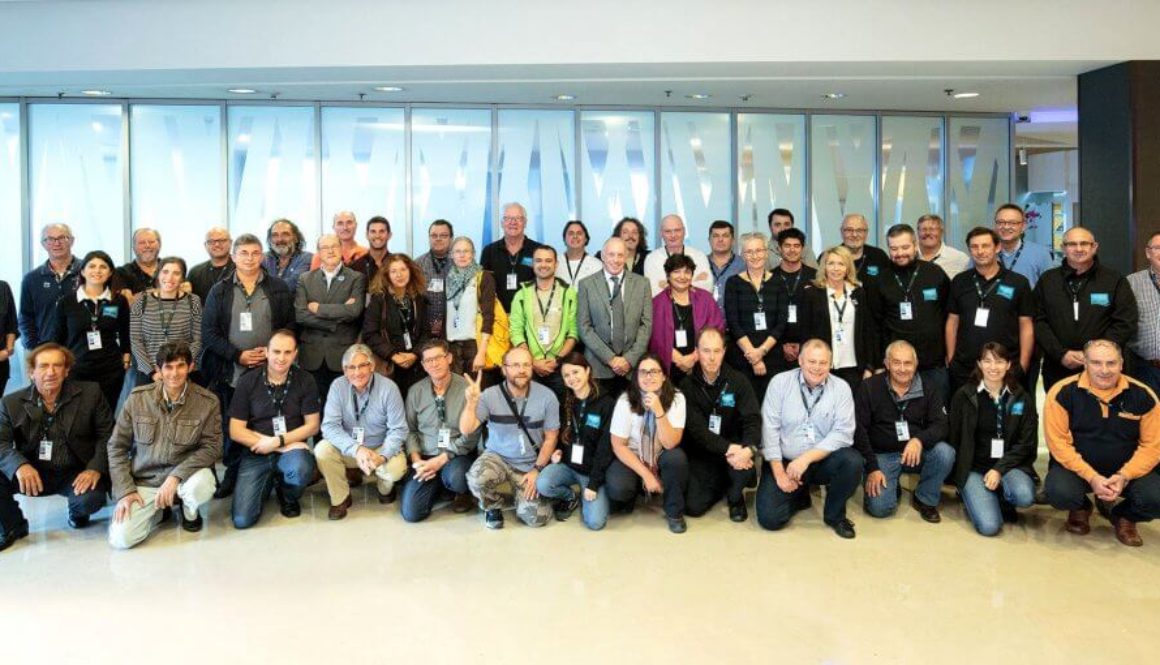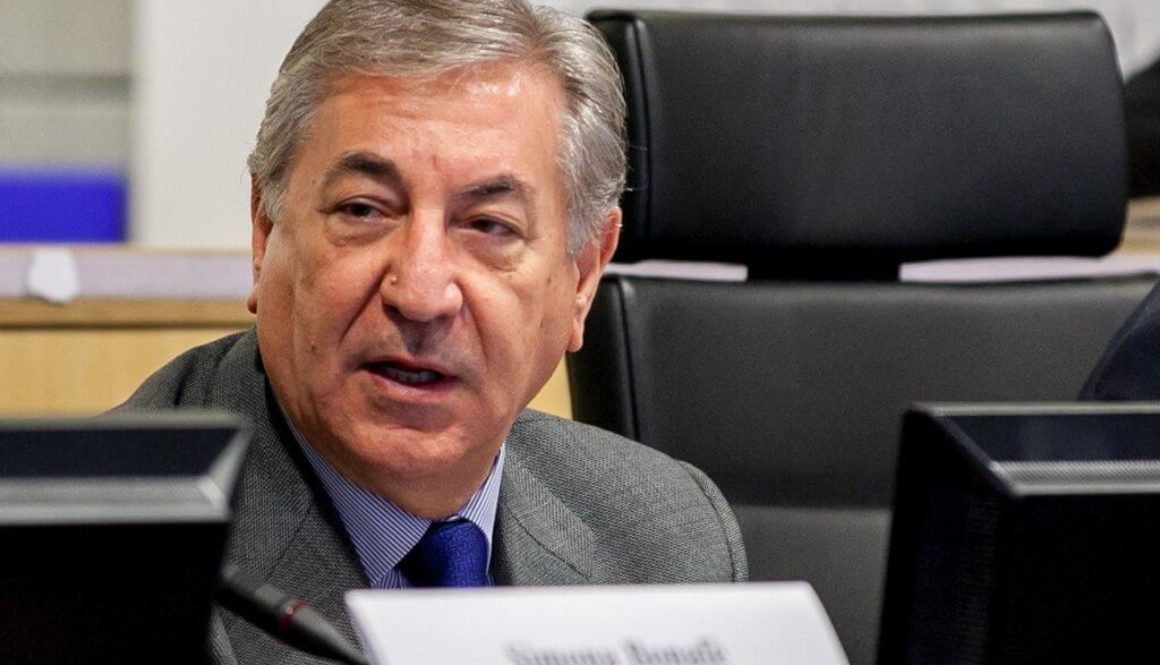A meeting of minds in Warsaw

The 2016 Congress for the low impact fisheries organized
by the European platform LIFE


The 2016 Congress for the low impact fisheries organized
by the European platform LIFE


Brussels, 18th October 2016
Brian O’Riordan
LIFE staff and members will meet with DG Mare services on 19th October in a multi-stakeholder consultation ahead of the ahead of the 20th Special Meeting of ICCAT in Portugal, November 14 to 21. Ahead of the stakeholder meeting, LIFE sent a letter to Commissioner Vella calling for a dedicated small scale fishing quota:
Bluefin tuna is coming back, quotas are increasing, LIFE demands a fair share for small scale low impact fishers. A combination of industrial and illegal fishing over decades drove the Atlantic Bluefin tuna populations to endangered levels by the 1990s. Thanks to the recovery plan adopted by the International Commission for the Conservation of Atlantic Tuna (ICCAT) in 2006, evidence suggests that Atlantic Bluefin tuna is now making a comeback.
ICCAT is an inter-governmental fishery organisation responsible for the conservation of tunas and tuna-like species in the Atlantic Ocean and the Mediterranean, and is composed of 47 members. Under the 2006 recovery plan, which entered into force in 2007, the Bluefin tuna TAC was drastically reduced, minimum landing size increased from 10 to 30 kilos, and strict controls placed on the landing of catches.
In 2014 ICCAT announced that TACs would be increased by 60% over 3 years (20% per year) up to 2017. However, recent European legislation potentially restricts the beneficiaries of these quota increases to vessels that were fishing for Bluefin tuna between January 2007 and July 2008. Such a restriction would unfairly discriminate against many small scale fishery operations that were constrained or otherwise barred from catching Bluefin tuna during this period.
LIFE is also concerned that under Spanish law, tuna quotas may be transferred between vessels engaged in the tuna fishery, paving the way for the privatization of access rights to a public resource under an ITQ system.
LIFE would therefore like to see the imposition by ICCAT of a dedicated non-transferable quota for small-scale low impact fisheries, ring fenced, to be assigned to small scale polyvalent vessels and small scale hand line operations that both catch tuna as a target species, and as a by-catch.
♦ ♦ ♦


Brussels, 18th October 2016
Brian O’Riordan
LIFE staff and members will meet with DG Mare services on 19th October in a multi-stakeholder consultation ahead of the ahead of the 20th Special Meeting of ICCAT in Portugal, November 14 to 21. Ahead of the stakeholder meeting, LIFE sent a letter to Commissioner Vella calling for a dedicated small scale fishing quota:
Bluefin tuna is coming back, quotas are increasing, LIFE demands a fair share for small scale low impact fishers. A combination of industrial and illegal fishing over decades drove the Atlantic Bluefin tuna populations to endangered levels by the 1990s. Thanks to the recovery plan adopted by the International Commission for the Conservation of Atlantic Tuna (ICCAT) in 2006, evidence suggests that Atlantic Bluefin tuna is now making a comeback.
ICCAT is an inter-governmental fishery organisation responsible for the conservation of tunas and tuna-like species in the Atlantic Ocean and the Mediterranean, and is composed of 47 members. Under the 2006 recovery plan, which entered into force in 2007, the Bluefin tuna TAC was drastically reduced, minimum landing size increased from 10 to 30 kilos, and strict controls placed on the landing of catches.
In 2014 ICCAT announced that TACs would be increased by 60% over 3 years (20% per year) up to 2017. However, recent European legislation potentially restricts the beneficiaries of these quota increases to vessels that were fishing for Bluefin tuna between January 2007 and July 2008. Such a restriction would unfairly discriminate against many small scale fishery operations that were constrained or otherwise barred from catching Bluefin tuna during this period.
LIFE is also concerned that under Spanish law, tuna quotas may be transferred between vessels engaged in the tuna fishery, paving the way for the privatization of access rights to a public resource under an ITQ system.
LIFE would therefore like to see the imposition by ICCAT of a dedicated non-transferable quota for small-scale low impact fisheries, ring fenced, to be assigned to small scale polyvalent vessels and small scale hand line operations that both catch tuna as a target species, and as a by-catch.
♦ ♦ ♦


Brussels, 18th October 2016
Brian O’Riordan
LIFE staff and members will meet with DG Mare services on 19th October in a multi-stakeholder consultation ahead of the ahead of the 20th Special Meeting of ICCAT in Portugal, November 14 to 21. Ahead of the stakeholder meeting, LIFE sent a letter to Commissioner Vella calling for a dedicated small scale fishing quota:
Bluefin tuna is coming back, quotas are increasing, LIFE demands a fair share for small scale low impact fishers. A combination of industrial and illegal fishing over decades drove the Atlantic Bluefin tuna populations to endangered levels by the 1990s. Thanks to the recovery plan adopted by the International Commission for the Conservation of Atlantic Tuna (ICCAT) in 2006, evidence suggests that Atlantic Bluefin tuna is now making a comeback.
ICCAT is an inter-governmental fishery organisation responsible for the conservation of tunas and tuna-like species in the Atlantic Ocean and the Mediterranean, and is composed of 47 members. Under the 2006 recovery plan, which entered into force in 2007, the Bluefin tuna TAC was drastically reduced, minimum landing size increased from 10 to 30 kilos, and strict controls placed on the landing of catches.
In 2014 ICCAT announced that TACs would be increased by 60% over 3 years (20% per year) up to 2017. However, recent European legislation potentially restricts the beneficiaries of these quota increases to vessels that were fishing for Bluefin tuna between January 2007 and July 2008. Such a restriction would unfairly discriminate against many small scale fishery operations that were constrained or otherwise barred from catching Bluefin tuna during this period.
LIFE is also concerned that under Spanish law, tuna quotas may be transferred between vessels engaged in the tuna fishery, paving the way for the privatization of access rights to a public resource under an ITQ system.
LIFE would therefore like to see the imposition by ICCAT of a dedicated non-transferable quota for small-scale low impact fisheries, ring fenced, to be assigned to small scale polyvalent vessels and small scale hand line operations that both catch tuna as a target species, and as a by-catch.
♦ ♦ ♦


Brussels, 18th October 2016
Brian O’Riordan
LIFE staff and members will meet with DG Mare services on 19th October in a multi-stakeholder consultation ahead of the ahead of the 20th Special Meeting of ICCAT in Portugal, November 14 to 21. Ahead of the stakeholder meeting, LIFE sent a letter to Commissioner Vella calling for a dedicated small scale fishing quota:
Bluefin tuna is coming back, quotas are increasing, LIFE demands a fair share for small scale low impact fishers. A combination of industrial and illegal fishing over decades drove the Atlantic Bluefin tuna populations to endangered levels by the 1990s. Thanks to the recovery plan adopted by the International Commission for the Conservation of Atlantic Tuna (ICCAT) in 2006, evidence suggests that Atlantic Bluefin tuna is now making a comeback.
ICCAT is an inter-governmental fishery organisation responsible for the conservation of tunas and tuna-like species in the Atlantic Ocean and the Mediterranean, and is composed of 47 members. Under the 2006 recovery plan, which entered into force in 2007, the Bluefin tuna TAC was drastically reduced, minimum landing size increased from 10 to 30 kilos, and strict controls placed on the landing of catches.
In 2014 ICCAT announced that TACs would be increased by 60% over 3 years (20% per year) up to 2017. However, recent European legislation potentially restricts the beneficiaries of these quota increases to vessels that were fishing for Bluefin tuna between January 2007 and July 2008. Such a restriction would unfairly discriminate against many small scale fishery operations that were constrained or otherwise barred from catching Bluefin tuna during this period.
LIFE is also concerned that under Spanish law, tuna quotas may be transferred between vessels engaged in the tuna fishery, paving the way for the privatization of access rights to a public resource under an ITQ system.
LIFE would therefore like to see the imposition by ICCAT of a dedicated non-transferable quota for small-scale low impact fisheries, ring fenced, to be assigned to small scale polyvalent vessels and small scale hand line operations that both catch tuna as a target species, and as a by-catch.
♦ ♦ ♦


Brussels, 18th October 2016
Brian O’Riordan
LIFE staff and members will meet with DG Mare services on 19th October in a multi-stakeholder consultation ahead of the ahead of the 20th Special Meeting of ICCAT in Portugal, November 14 to 21. Ahead of the stakeholder meeting, LIFE sent a letter to Commissioner Vella calling for a dedicated small scale fishing quota:
Bluefin tuna is coming back, quotas are increasing, LIFE demands a fair share for small scale low impact fishers. A combination of industrial and illegal fishing over decades drove the Atlantic Bluefin tuna populations to endangered levels by the 1990s. Thanks to the recovery plan adopted by the International Commission for the Conservation of Atlantic Tuna (ICCAT) in 2006, evidence suggests that Atlantic Bluefin tuna is now making a comeback.
ICCAT is an inter-governmental fishery organisation responsible for the conservation of tunas and tuna-like species in the Atlantic Ocean and the Mediterranean, and is composed of 47 members. Under the 2006 recovery plan, which entered into force in 2007, the Bluefin tuna TAC was drastically reduced, minimum landing size increased from 10 to 30 kilos, and strict controls placed on the landing of catches.
In 2014 ICCAT announced that TACs would be increased by 60% over 3 years (20% per year) up to 2017. However, recent European legislation potentially restricts the beneficiaries of these quota increases to vessels that were fishing for Bluefin tuna between January 2007 and July 2008. Such a restriction would unfairly discriminate against many small scale fishery operations that were constrained or otherwise barred from catching Bluefin tuna during this period.
LIFE is also concerned that under Spanish law, tuna quotas may be transferred between vessels engaged in the tuna fishery, paving the way for the privatization of access rights to a public resource under an ITQ system.
LIFE would therefore like to see the imposition by ICCAT of a dedicated non-transferable quota for small-scale low impact fisheries, ring fenced, to be assigned to small scale polyvalent vessels and small scale hand line operations that both catch tuna as a target species, and as a by-catch.
♦ ♦ ♦


Brussels, 18th October 2016
Brian O’Riordan
LIFE staff and members will meet with DG Mare services on 19th October in a multi-stakeholder consultation ahead of the ahead of the 20th Special Meeting of ICCAT in Portugal, November 14 to 21. Ahead of the stakeholder meeting, LIFE sent a letter to Commissioner Vella calling for a dedicated small scale fishing quota:
Bluefin tuna is coming back, quotas are increasing, LIFE demands a fair share for small scale low impact fishers. A combination of industrial and illegal fishing over decades drove the Atlantic Bluefin tuna populations to endangered levels by the 1990s. Thanks to the recovery plan adopted by the International Commission for the Conservation of Atlantic Tuna (ICCAT) in 2006, evidence suggests that Atlantic Bluefin tuna is now making a comeback.
ICCAT is an inter-governmental fishery organisation responsible for the conservation of tunas and tuna-like species in the Atlantic Ocean and the Mediterranean, and is composed of 47 members. Under the 2006 recovery plan, which entered into force in 2007, the Bluefin tuna TAC was drastically reduced, minimum landing size increased from 10 to 30 kilos, and strict controls placed on the landing of catches.
In 2014 ICCAT announced that TACs would be increased by 60% over 3 years (20% per year) up to 2017. However, recent European legislation potentially restricts the beneficiaries of these quota increases to vessels that were fishing for Bluefin tuna between January 2007 and July 2008. Such a restriction would unfairly discriminate against many small scale fishery operations that were constrained or otherwise barred from catching Bluefin tuna during this period.
LIFE is also concerned that under Spanish law, tuna quotas may be transferred between vessels engaged in the tuna fishery, paving the way for the privatization of access rights to a public resource under an ITQ system.
LIFE would therefore like to see the imposition by ICCAT of a dedicated non-transferable quota for small-scale low impact fisheries, ring fenced, to be assigned to small scale polyvalent vessels and small scale hand line operations that both catch tuna as a target species, and as a by-catch.
♦ ♦ ♦


Brussels, 18th October 2016
Brian O’Riordan
LIFE staff and members will meet with DG Mare services on 19th October in a multi-stakeholder consultation ahead of the ahead of the 20th Special Meeting of ICCAT in Portugal, November 14 to 21. Ahead of the stakeholder meeting, LIFE sent a letter to Commissioner Vella calling for a dedicated small scale fishing quota:
Bluefin tuna is coming back, quotas are increasing, LIFE demands a fair share for small scale low impact fishers. A combination of industrial and illegal fishing over decades drove the Atlantic Bluefin tuna populations to endangered levels by the 1990s. Thanks to the recovery plan adopted by the International Commission for the Conservation of Atlantic Tuna (ICCAT) in 2006, evidence suggests that Atlantic Bluefin tuna is now making a comeback.
ICCAT is an inter-governmental fishery organisation responsible for the conservation of tunas and tuna-like species in the Atlantic Ocean and the Mediterranean, and is composed of 47 members. Under the 2006 recovery plan, which entered into force in 2007, the Bluefin tuna TAC was drastically reduced, minimum landing size increased from 10 to 30 kilos, and strict controls placed on the landing of catches.
In 2014 ICCAT announced that TACs would be increased by 60% over 3 years (20% per year) up to 2017. However, recent European legislation potentially restricts the beneficiaries of these quota increases to vessels that were fishing for Bluefin tuna between January 2007 and July 2008. Such a restriction would unfairly discriminate against many small scale fishery operations that were constrained or otherwise barred from catching Bluefin tuna during this period.
LIFE is also concerned that under Spanish law, tuna quotas may be transferred between vessels engaged in the tuna fishery, paving the way for the privatization of access rights to a public resource under an ITQ system.
LIFE would therefore like to see the imposition by ICCAT of a dedicated non-transferable quota for small-scale low impact fisheries, ring fenced, to be assigned to small scale polyvalent vessels and small scale hand line operations that both catch tuna as a target species, and as a by-catch.
♦ ♦ ♦


Brussels, 18th October 2016
Brian O’Riordan
LIFE staff and members will meet with DG Mare services on 19th October in a multi-stakeholder consultation ahead of the ahead of the 20th Special Meeting of ICCAT in Portugal, November 14 to 21. Ahead of the stakeholder meeting, LIFE sent a letter to Commissioner Vella calling for a dedicated small scale fishing quota:
Bluefin tuna is coming back, quotas are increasing, LIFE demands a fair share for small scale low impact fishers. A combination of industrial and illegal fishing over decades drove the Atlantic Bluefin tuna populations to endangered levels by the 1990s. Thanks to the recovery plan adopted by the International Commission for the Conservation of Atlantic Tuna (ICCAT) in 2006, evidence suggests that Atlantic Bluefin tuna is now making a comeback.
ICCAT is an inter-governmental fishery organisation responsible for the conservation of tunas and tuna-like species in the Atlantic Ocean and the Mediterranean, and is composed of 47 members. Under the 2006 recovery plan, which entered into force in 2007, the Bluefin tuna TAC was drastically reduced, minimum landing size increased from 10 to 30 kilos, and strict controls placed on the landing of catches.
In 2014 ICCAT announced that TACs would be increased by 60% over 3 years (20% per year) up to 2017. However, recent European legislation potentially restricts the beneficiaries of these quota increases to vessels that were fishing for Bluefin tuna between January 2007 and July 2008. Such a restriction would unfairly discriminate against many small scale fishery operations that were constrained or otherwise barred from catching Bluefin tuna during this period.
LIFE is also concerned that under Spanish law, tuna quotas may be transferred between vessels engaged in the tuna fishery, paving the way for the privatization of access rights to a public resource under an ITQ system.
LIFE would therefore like to see the imposition by ICCAT of a dedicated non-transferable quota for small-scale low impact fisheries, ring fenced, to be assigned to small scale polyvalent vessels and small scale hand line operations that both catch tuna as a target species, and as a by-catch.
♦ ♦ ♦


Brussels, 18th October 2016
Brian O’Riordan
LIFE staff and members will meet with DG Mare services on 19th October in a multi-stakeholder consultation ahead of the ahead of the 20th Special Meeting of ICCAT in Portugal, November 14 to 21. Ahead of the stakeholder meeting, LIFE sent a letter to Commissioner Vella calling for a dedicated small scale fishing quota:
Bluefin tuna is coming back, quotas are increasing, LIFE demands a fair share for small scale low impact fishers. A combination of industrial and illegal fishing over decades drove the Atlantic Bluefin tuna populations to endangered levels by the 1990s. Thanks to the recovery plan adopted by the International Commission for the Conservation of Atlantic Tuna (ICCAT) in 2006, evidence suggests that Atlantic Bluefin tuna is now making a comeback.
ICCAT is an inter-governmental fishery organisation responsible for the conservation of tunas and tuna-like species in the Atlantic Ocean and the Mediterranean, and is composed of 47 members. Under the 2006 recovery plan, which entered into force in 2007, the Bluefin tuna TAC was drastically reduced, minimum landing size increased from 10 to 30 kilos, and strict controls placed on the landing of catches.
In 2014 ICCAT announced that TACs would be increased by 60% over 3 years (20% per year) up to 2017. However, recent European legislation potentially restricts the beneficiaries of these quota increases to vessels that were fishing for Bluefin tuna between January 2007 and July 2008. Such a restriction would unfairly discriminate against many small scale fishery operations that were constrained or otherwise barred from catching Bluefin tuna during this period.
LIFE is also concerned that under Spanish law, tuna quotas may be transferred between vessels engaged in the tuna fishery, paving the way for the privatization of access rights to a public resource under an ITQ system.
LIFE would therefore like to see the imposition by ICCAT of a dedicated non-transferable quota for small-scale low impact fisheries, ring fenced, to be assigned to small scale polyvalent vessels and small scale hand line operations that both catch tuna as a target species, and as a by-catch.
♦ ♦ ♦